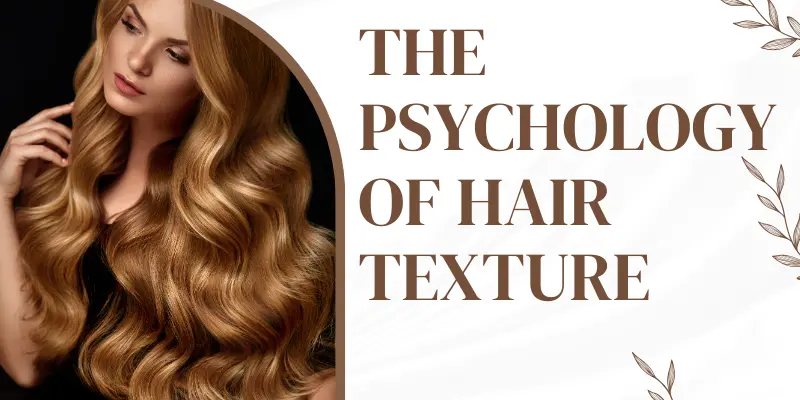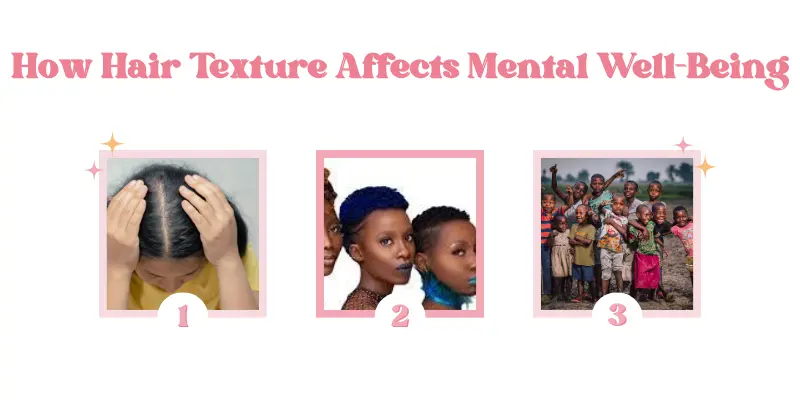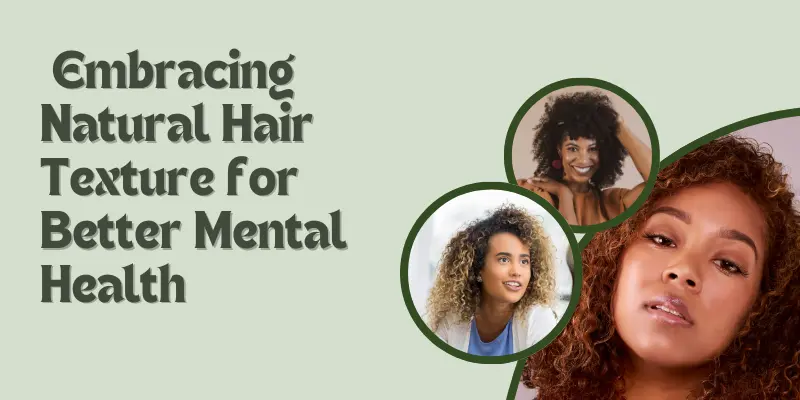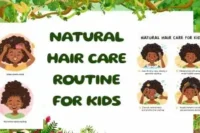How Hair Texture Impacts Mental Well-Being- The Surprising Link to Confidence
Published: 16 Feb 2025
Hair is more than just a physical attribute – it’s a powerful form of self-expression and identity. Many people don’t realize that hair texture impacts mental well-being by shaping confidence and how we feel about ourselves. From curly to straight, wavy to coily, hair texture plays a key role in our self-image and how others see us. Beyond looks, understanding how hair texture influences mental health can help us embrace ourselves better.
This article explores how hair texture affects self-esteem, confidence, and emotional health. We’ll dive into the psychology of hair, societal beauty pressures, and how loving your natural texture can improve your overall well-being.
1. The Psychology of Hair Texture
Blending hair care with self-care creates a soothing ritual that nourishes both your strands and your spirit. Simple acts like applying a hair mask or doing a gentle scalp massage can ease stress and improve overall well-being—making it a valuable part of any hair care guide.

These moments help you reconnect with yourself while giving your hair the attention it deserves. Aromatherapy oils, warm towels, and soft music can enhance the experience. It’s more than beauty—it’s a calming form of personal healing.
1.1 Hair as a Form of Identity
Textured hair is deeply tied to cultural, racial, and personal identity. For example:
- In Black culture, curly and coily hair is often celebrated as a symbol of heritage and pride.
- In East Asian beauty standards, straight hair is frequently idealized, influencing how individuals perceive their natural texture.
These cultural associations shape how people view their hair and, by extension, themselves.
1.2 Hair Texture and Self-Perception
Society often links hair texture to beauty standards, creating pressure to conform. Phrases like “good hair” (often associated with straight or looser curls) and “bad hair” (used to describe tighter curls or coily textures) perpetuate harmful stereotypes. These labels can lead to internalized negativity, affecting how individuals perceive their natural hair.
2. How Hair Texture Affects Mental Well-Being
Hair texture plays a powerful role in shaping self-image and confidence. Struggling to manage or embrace natural texture can lead to stress or frustration.

On the other hand, accepting and celebrating your unique hair type can boost self-esteem and emotional wellness. Embracing your texture is more than beauty—it’s a form of self-acceptance and mental empowerment.
2.1 Confidence and Self-Esteem
Your hair texture can significantly impact your confidence. For many, embracing their natural texture is empowering. Studies show that people who feel good about their hair are more likely to have higher self-esteem. Conversely, struggling with hair texture, whether due to societal pressures or personal dissatisfaction, can lead to feelings of inadequacy.
2.2 Anxiety and Insecurity
Societal beauty standards often glorify certain hair textures while marginalizing others. This can create anxiety and insecurity, especially for those whose natural texture doesn’t align with these ideals. The emotional toll of constantly altering hair, through straightening, relaxing, or other treatments, can also contribute to stress and low self-worth.
2.3 Hair Discrimination and Mental Health
Hair discrimination is a harsh reality for many. In workplaces and schools, natural hair textures are often unfairly policed, leading to feelings of exclusion and frustration. For example, the CROWN Act (Creating a Respectful and Open World for Natural Hair) was introduced to combat such discrimination, highlighting its mental health impact.
3. Embracing Natural Hair Texture for Better Mental Health
Embracing your natural hair texture fosters self-love, confidence, and inner peace. Letting go of unrealistic beauty standards can ease emotional pressure and boost self-worth.

Natural hair care becomes a celebration, not a struggle, promoting positive mental well-being. When you honor your texture, you also honor your true self.
3.1 The Natural Hair Movement
The natural hair movement has been a game-changer, encouraging people to embrace their authentic selves. Social media platforms like Instagram and YouTube have played a huge role, offering tutorials, support, and inspiration for those transitioning to natural hair.
3.2 Benefits of Embracing Your Hair Texture
- Improved Self-Confidence: Accepting your natural texture can boost self-esteem and reduce anxiety.
- Financial and Time Savings: Avoiding chemical treatments saves money and time, reducing stress.
- Healthier Hair: Natural hair care practices often lead to stronger, healthier hair.
3.3 Tips for Transitioning to Natural Hair
Join online communities for support and advice.
Start with a big chop or gradually trim chemically treated hair.
Experiment with protective styles like braids or twists.
Use moisturizing products designed for your hair type.
4. Hair Care as Self-Care
Nurturing your hair isn’t just about beauty—it’s a calming act of self-care that restores both confidence and peace of mind.
4.1 The Therapeutic Nature of Hair Care
Taking care of your hair can be a form of mindfulness and self-care. Routines like scalp massages, deep conditioning, and styling can be calming and meditative, helping to reduce stress and improve mental well-being—especially beneficial if you’re managing issues like a dry scalp.
4.2 Building a Positive Relationship with Your Hair
Focus on health over conformity. Celebrate your hair’s unique texture and experiment with styles that make you feel good. Journaling or affirmations can also help build a positive mindset about your hair.
5. Expert Insights and Studies
Recent studies highlight the strong connection between hair care routines and emotional well-being. Experts agree that consistent grooming practices can reduce stress and improve self-esteem.

Dermatologists and psychologists alike emphasize the therapeutic value of mindful hair rituals. These insights reinforce that hair care is not just cosmetic—it’s a meaningful part of mental wellness.
5.1 Psychological Studies on Hair and Self-Image
Research shows that hair satisfaction is closely linked to overall self-esteem. A study published in the Journal of Health Psychology found that women who embraced their natural hair reported higher confidence and happiness levels.
5.2 Quotes from Hair Stylists or Psychologists
- “Your hair is your crown, wear it with pride. Celebrity Hairstylist
- “Embracing your natural texture is a form of self-love. Psychologist
6. Personal Stories and Testimonials
- Sarah’s Story: After years of straightening her curls, Sarah decided to go natural. She shares how this decision transformed her confidence and mental health.
- James’ Journey: James struggled with hair loss but found empowerment through embracing his baldness, proving that self-acceptance comes in many forms.
Conclusion
Hair texture is more than just a physical trait; it’s deeply intertwined with mental well-being. Hair texture impacts mental well-being by shaping identity, influencing confidence, and affecting how we feel about ourselves. The way we perceive and care for our hair can have a profound impact on our emotional health. By embracing your natural texture and prioritizing self-care, you can build a healthier relationship with your hair and yourself.
FAQs: Hair Texture Impacts Mental Well-Being
Hair texture can have a powerful influence on how people perceive themselves and how they believe others view them. Those who struggle to fit into mainstream beauty standards may experience stress, anxiety, or even feelings of inadequacy. Constant pressure to alter or “tame” hair can be emotionally draining and affect self-image over time. On the other hand, embracing natural hair often leads to increased self-confidence and self-acceptance. Feeling proud of one’s hair can directly boost mental well-being.
Self-esteem is often shaped by how we feel about our physical appearance, and hair plays a central role in that perception. People who feel their hair reflects their personality and beauty are more likely to feel confident in social and professional settings. When hair texture is celebrated instead of criticized, it reinforces self-worth. Conversely, negative comments or internalized beauty biases can cause insecurity. Learning to appreciate and care for one’s hair can be a significant step toward stronger self-esteem.
The natural hair movement is a cultural and social push that encourages individuals—especially those with textured or curly hair—to embrace their natural hair without chemical straightening or heat damage. It challenges outdated beauty norms that often favor Eurocentric styles. This movement promotes self-love, body autonomy, and acceptance of diverse hair textures. It has also created communities of support, where people share tips, styles, and experiences. Beyond aesthetics, it’s about reclaiming identity and rejecting harmful beauty pressures.
Hair discrimination—judging or treating someone unfairly because of their natural texture or style—can have lasting psychological effects. Experiencing criticism, workplace bias, or social exclusion due to hair can lead to chronic stress and lowered self-esteem. Over time, these experiences may contribute to anxiety, depression, or a sense of alienation. Legal measures like the CROWN Act aim to combat such discrimination, but cultural attitudes still need to shift. Feeling safe and accepted in one’s natural hair is essential for emotional well-being.
Transitioning to natural hair is a personal and emotional journey that requires patience and care. Start by trimming damaged or chemically treated hair gradually to allow natural texture to grow in. Consistently moisturize to keep hair healthy and manageable during the transition phase. Protective styles like braids, twists, or wigs can help blend textures and reduce breakage. Joining online or in-person support groups can encourage, provide styling ideas, and offer reassurance along the way.
A consistent hair care routine can be grounding, much like any other form of self-care. Taking time to wash, moisturize, and style hair provides a sense of control and structure in daily life. Scalp massages can promote relaxation by reducing tension and boosting blood flow. Experimenting with styles can spark creativity and self-expression, uplifting mood. The process of caring for hair can be a mindful ritual that helps reduce stress and build self-confidence.
Transitioning to natural hair is a personal and emotional journey that requires patience and care. Start by trimming damaged or chemically treated hair gradually to allow natural texture to grow in. Consistently moisturize to keep hair healthy and manageable during the transition phase. Protective styles like braids, twists, or wigs can help blend textures and reduce breakage. Joining online or in-person support groups can encourage, provide styling ideas, and offer reassurance along the way.
For many people, hair is deeply tied to cultural heritage and personal identity. Specific textures, styles, and rituals can carry historical significance, representing resilience, ancestry, and pride. In some cultures, hair is a symbol of beauty, status, or even spiritual connection. Wearing one’s natural texture can be a way of honoring these traditions and resisting assimilation pressures. In this way, hair becomes more than style—it becomes a statement of belonging and cultural expression.
Research has shown that hair plays a significant role in how individuals perceive themselves and how they believe they’re perceived by others. Studies indicate that women with natural hair who embrace it often report higher levels of self-confidence and authenticity. Positive hair perception correlates directly with self-esteem and overall life satisfaction. Conversely, those who feel pressured to alter their hair may experience higher stress levels. These findings highlight the emotional impact of hair acceptance.
Building a positive relationship with your hair starts with shifting the focus from trends to health and personal comfort. Explore styles that make you feel confident and suit your lifestyle rather than trying to fit into narrow beauty standards. Incorporate affirmations and self-love practices into your hair care routine. Learn about your hair’s unique needs through research and experimentation. Over time, consistent care and acceptance will help you view your hair as a source of pride, not stress.

- Be Respectful
- Stay Relevant
- Stay Positive
- True Feedback
- Encourage Discussion
- Avoid Spamming
- No Fake News
- Don't Copy-Paste
- No Personal Attacks

- Be Respectful
- Stay Relevant
- Stay Positive
- True Feedback
- Encourage Discussion
- Avoid Spamming
- No Fake News
- Don't Copy-Paste
- No Personal Attacks





